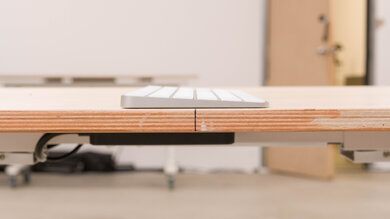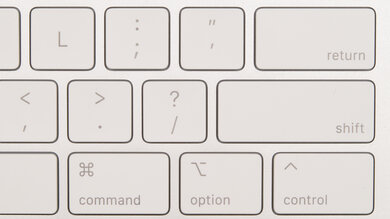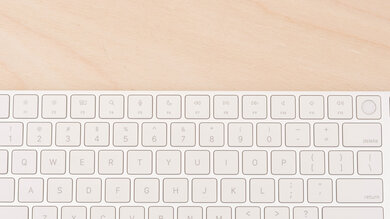The Apple Magic Keyboard with Touch ID and Numeric Keypad is the second generation of the Apple Magic keyboards, replacing the Apple Magic Keyboard 2017. There are only a few design differences compared to the older model, with rounded edges and new hotkey buttons, but the main feature is the new Touch ID. It works with any M1 Mac computer, so you can quickly unlock it, but it's not compatible with the iPad or iPhone. It's available in a compact and a full-size option with a numpad, but it still lacks backlighting, which is disappointing for those who work in a dark environment. It's also only available in the silver color scheme if you buy it on its own, even though Apple sells other colors with the 24-inch iMac.
Our Verdict
The Apple Magic Keyboard with Touch ID performs poorly for gaming but isn't designed for this use. While the switches have a short pre-travel distance and are fairly light to press, the latency is too high for competitive gaming and only adequate for casual gaming. You also can't reprogram or set macros to any key.
- Scissor switches have a short pre-travel distance.
- Can't reprogram or set macros to any key.
- No backlighting.
- Latency is too high for competitive gaming.
The Apple Magic Keyboard with Touch ID is very good for office use. Typing feels great because the keys are light and offer good tactile feedback, and you shouldn't feel fatigued during long typing sessions, thanks to the low profile. It connects to any device via Bluetooth, but only one device at a time. Its Touch ID feature only works with certain macOS computers, which isn't convenient if you don't have those.
- Connects to any device via Bluetooth.
- Great typing quality.
- Quiet typing noise.
- No multi-device pairing.
The Apple Magic Keyboard with Touch ID is decent for mobile use. The variant we tested is full-size, which is too big to carry around, but there's a compact version available. It connects with any device via Bluetooth, but there's no multi-device pairing feature. While most keys work with iPadOS and iOS, the Touch ID isn't compatible with either.
- Connects to any device via Bluetooth.
- Lightweight design and excellent build quality.
- No multi-device pairing.
- Touch ID feature isn't compatible with iPad or iPhone.
The Apple Magic Keyboard with Touch ID is unremarkable for programming. It lacks a multi-device pairing feature, doesn't have backlighting, and you can't reprogram any of the keys. On the plus side, it offers great typing quality, and you shouldn't feel much fatigue during long programming sessions because it has a low profile.
- Great typing quality.
- Quiet typing noise.
- Can't reprogram or set macros to any key.
- No backlighting.
- No multi-device pairing.
The Apple Magic Keyboard with Touch ID is poor for home theater PC use. It's not designed for it, so it doesn't have a trackpad, and it also lacks any sort of backlighting. Luckily, it connects to any device via Bluetooth.
- Connects to any device via Bluetooth.
- No backlighting.
- Lacks a trackpad.
The Apple Magic Keyboard with Touch ID delivers poor raw performance overall. It has high single-key and multi-key latency using all connection types and an extremely low effective update rate via Bluetooth. While still a good option for everyday tasks and productivity, this keyboard isn't well suited for gaming overall.
Changelog
- Updated Jan 09, 2026: Our 1.4.2 Test Bench Update makes changes to the Hardware Customizability test group. We've created a new Magnetic Switch Compatibility test and renamed our previous PCB Socket test to Mechanical Switch Compatibility. See our full changelog.
-
Updated Jul 31, 2025:
Added a reference to the Razer Joro as an alternative with better latency performance in the Single-Key Latency box.
- Updated Feb 09, 2024: When updating this keyboard to our current test bench, we didn't list latency results over a wired connection in the Multi-Key Latency section for using a wired connection.
- Updated Nov 29, 2023: We've converted this review to Test Bench 1.3.1, which adds a new estimated PCB latency test to the Single-Key Latency section and a new Analog test to the Switches section of this review. You can see the full changelog here.
Check Price
Differences Between Sizes And Variants
We tested the Apple Magic Keyboard with Touch ID and Numeric Keypad, which is part of the second generation of Magic Keyboards from Apple, replacing the Apple Magic Keyboard 2017. You can see the differences with the other second-gen keyboards below. When purchased separately, the keyboard is only available in one color, even though Apple offers it in different color schemes when bundled with the 24 inch iMac.
| Name | Size | Touch ID |
|---|---|---|
| Apple Magic Keyboard | Compact | No |
| Apple Magic Keyboard with Touch ID | Compact | Yes |
| Apple Magic Keyboard with Touch ID and Numeric Keypad | Full | Yes |
If you have the keyboard and it's different from ours, let us know and we'll update the review. You can see the label for our unit here.
Popular Keyboard Comparisons
The Apple Magic Keyboard with Touch ID is a good office keyboard, but it's only really useful if you have a Mac with the M1 chip so that you can use the Touch ID feature. Otherwise, it's an expensive keyboard and there are cheaper options available, like the Logitech MX Keys.
Also see our recommendations for the best keyboards for Mac, the best keyboards for programmers, and the best keyboards for iPad.
The Logitech MX Keys is a more versatile keyboard than the Apple Magic Keyboard with Touch ID and Numeric Keypad. The Logitech has multi-device pairing with up to three devices at once, and it has white backlighting, both of which the Apple doesn't have. The Logitech also has dedicated software to reprogram a few function keys, and it works fully on Windows and macOS. However, the Apple keyboard is meant for Mac computers and it has a Touch ID button, which the Logitech doesn't have.
The Apple Magic Keyboard with Touch ID and Numeric Keypad and the Logitech MX Keys Mini are wireless, low-profile boards. The Apple is a full-size model, though it also comes in the same compact size as the Logitech. The Apple has a Numpad, a Touch ID key in the top right corner, and full compatibility with macOS. Also, you can use its cable for changing and in wired mode, while the Logitech is a wireless-only board that only lets you use the cable to charge the battery. That said, the Logitech has a few more features, like white backlighting, multi-device pairing via Bluetooth, and customization software to remap some keys.
The Apple Magic Keyboard with Touch ID and Numeric Keypad is a newer version of the Apple Magic Keyboard 2017. As the name suggests, the newer model features Touch ID with compatible Mac computers. It also has a few aesthetic changes like rounded edges and new shortcut hotkeys. The model we tested is full-size, but it's also available in a compact version like the 2017 model we tested. Typing also feels better on the newer keyboard because the keys are more tactile. That said, the newer model we tested flexes more than the 2017 version, but it's also significantly wider, so this is to be expected.
Although both under the same Magic Keyboard name, the Apple Magic Keyboard for iPad 2021 and the Apple Magic Keyboard with Touch ID and Numeric Keypad are very different. The one for the iPad is a folio case designed to protect the iPad, it can only connect to it via the Smart Connector, and it has a trackpad so that it's like a MacBook laptop. On the other hand, the keyboard is meant for Mac computers, and it has Touch ID for compatible devices. It's also bigger, but there's a more compact variant if you need to carry it around.
Test Results

The Apple Magic Keyboard with Touch ID has excellent build quality. It has a solid plastic base plate with an aluminum chassis that feels sharp on the edges. It's a stiff keyboard, but it flexes more than the Apple Magic Keyboard 2017 because it's bigger. However, you still need a lot of force to bend it, and it shouldn't be an issue for normal use. The ABS keycaps have a low profile and feel nice to touch. Surprisingly, there's a fair amount of rattle when you shake the keyboard, and the larger keys rattle the most. It shouldn't be a problem for regular use, but the keys aren't as stable as they should be. Lastly, the four rubber feet underneath the keyboard keep in place.
The Apple Magic Keyboard with Touch ID is a low-profile keyboard with decent ergonomics. It doesn't have any incline settings or wrist rest, but you shouldn't need either because it sits nearly flat against the table, and you shouldn't experience fatigue.
The Apple Magic Keyboard with Touch ID doesn't have any backlighting, disappointing for those who want to work in a dark environment.
It comes with a nice braided cable that feels better than the standard rubber cable that came with the Apple Magic Keyboard 2017. It has a USB-C connector on the end, meaning you can connect it with any USB-C-compatible device. You can use it as a wired keyboard if you don't want a Bluetooth connection.
The Apple Magic Keyboard with Touch ID connects with one device at a time via Bluetooth. Apple advertises that the battery should last about a month, but it depends on your usage.
The stand-out feature of the Apple Magic Keyboard with Touch ID is the Touch ID on the top right. It's advertised to only work with Mac computers with the M1 chip and not iPads or iPhones.
The Apple Magic Keyboard with Touch ID's typing quality feels great. The key spacing is standard, and it's comfortable to type on. The switches offer good feedback, they aren't mushy, and typing is quick, thanks to the short pre-travel distance. Most of the keys are stable, but there's still some wobble to them, and the Spacebar makes a rattling noise when you actuate it. The Shift and Enter keys don't have this issue, though. Overall, it offers better typing quality than the Apple Magic Keyboard 2017 because there's more tactile feedback, but it's not a significant difference.
The Apple Magic Keyboard with Touch ID is very quiet and shouldn't bother people in a noise-sensitive environment.
The Apple Magic Keyboard with Touch ID uses the same scissor switches as the previous model. They're low profile and have a short pre-travel distance, but they require some force to get over the tactile bump. It means that you likely won't accidentally actuate keys often.
This keyboard has satisfactory single-key latency performance, specifically when used over a wired connection. It's suitable for casual gaming but unsuitable for playing games where input speed is important, such as competitive FPS or rhythm games.
We expect most people to use this keyboard wirelessly over a Bluetooth connection. The Single-Key Latency performance over a Bluetooth connection is significantly higher and much more inconsistent. It's still perfectly well-suited for everyday browsing or work, but you may notice slight, occasional delays even when playing casual games.
If you're looking for a similar keyboard with better latency performance, you should consider the Razer Joro.
This keyboard has very high and noticeably inconsistent multi-key latency for both the key press and key release when using this keyboard wirelessly over a Bluetooth connection, which is how we expect most people will use this keyboard.
You can use this keyboard in wired mode, which does provide better performance with Key Press and Key Release results around 20 ms. However, this is still quite high.
Overall, this keyboard isn't well-suited for playing games that require multi-key inputs where input speed is important, like competitive games. That said, it's still perfectly well-suited for lower-intensity casual games and everyday browsing or work.
This keyboard has poor chord split performance. It produces a very high 4-chord split delay and can't register eight simultaneous keys.
There's no dedicated software to reprogram keys or set macros. You can customize some shortcuts through the Settings menu on the Mac.
The Apple Magic Keyboard with Touch ID only fully works with all features with macOS, and you need an M1 Mac computer or newer for the Touch ID to work. As expected, the Touch ID doesn't work with any other operating system or Apple products. The hotkeys don't work on Linux and Windows, and the Fn key doesn't work on Windows either.
Everything works on iPadOS except for the Touch ID, and the F3 button doesn't work on iOS. We don't have the new iPad Pro with the M1 chip, but many reports online mention that it isn't compatible with the Touch ID. As for Android, the Fn button registers as Brightness Down, and the Option key brings up the voice assistant. The hotkeys don't work either, but there is a list of shortcuts, as you can see here.







